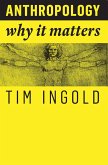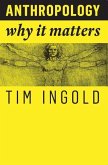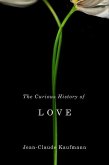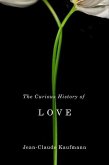What do we know about ordinary people in our towns and cities, about what really matters to them and how they organize their lives today? This book visits an ordinary street and looks into thirty households. It reveals the aspirations and frustrations, the tragedies and accomplishments that are played out behind the doors. It focuses on the things that matter to these people, which quite often turn out to be material things - their house, the dog, their music, the Christmas decorations. These are the means by which they express who they have become, and relationships to objects turn out to be central to their relationships with other people - children, lovers, brothers and friends.
If this is a typical street in a modern city like London, then what kind of society is this? It's not a community, nor a neighbourhood, nor is it a collection of isolated individuals. It isn't dominated by the family. We assume that social life is corrupted by materialism, made superficial and individualistic by a surfeit of consumer goods, but this is misleading. If the street isn't any of these things, then what is it?
This brilliant and revealing portrayal of a street in modern London, written by one the most prominent anthropologists, shows how much is to be gained when we stop lamenting what we think we used to be and focus instead on what we are now becoming. It reveals the forms by which ordinary people make sense of their lives, and the ways in which objects become our companions in the daily struggle to make life meaningful.
Hinweis: Dieser Artikel kann nur an eine deutsche Lieferadresse ausgeliefert werden.
If this is a typical street in a modern city like London, then what kind of society is this? It's not a community, nor a neighbourhood, nor is it a collection of isolated individuals. It isn't dominated by the family. We assume that social life is corrupted by materialism, made superficial and individualistic by a surfeit of consumer goods, but this is misleading. If the street isn't any of these things, then what is it?
This brilliant and revealing portrayal of a street in modern London, written by one the most prominent anthropologists, shows how much is to be gained when we stop lamenting what we think we used to be and focus instead on what we are now becoming. It reveals the forms by which ordinary people make sense of their lives, and the ways in which objects become our companions in the daily struggle to make life meaningful.
Hinweis: Dieser Artikel kann nur an eine deutsche Lieferadresse ausgeliefert werden.
"An outstanding piece of work: a fine example of modern anthropological fieldwork, a powerful corrective to the banal notion that materialism is synonymous with excessive individualism and, perhaps above all, an informed, sensitive, and wholly sympathetic guide to the human diversity to be found through the keyholes of our capital city."
-- Laurie Taylor, The Independent
"A wonderful and unusual antidote to the fear that humanity and individuality is losing its battle with modern consumerism. In his book, even the most trivial product of consumerism can be rendered almost magical by its owners."
-- Financial Times
"This book sums up how far social anthropology has progressed since Henry Mayhew wrote about the skull shapes of costermongers in the 19th century."
-- New Statesman
"A set of delicately drawn pen portraits of lives in a single, unnamed South London street ... this is a book quite out of the ordinary. While you read these pages, this is the street where you live."
-- Times Literary Supplement
"This is social anthropology at its finest."
-- Steven Carroll, The Age
"This is the very best kind of micro-ethnography. Miller writes better - and with more insight and compassion - than most novelists. This book will profoundly change the way you look at your friends' and neighbours' homes and possessions - and indeed your own."
-- Kate Fox, Social Issues Research Centre and author of Watching the English
"I am so impressed by Danny Miller's book. It is so keenly felt and beautifully written, it provides as deep a view of modern Londoners as early anthropologists tried to provide of residents of more distant and exotic zones. Miller has produced a marvelously personal and creative work, provoking us to wonder at the extraordinary attachments of ordinary people. This is a great and lasting achievement."
-- Sharon Zukin, Brooklyn College
"Through shoe leather fieldwork, human empathy, and unflinching readiness to discern, Daniel Miller shows the central role of material culture in contemporary urban life. An instant classic."
-- Mitchell Duneier, Princeton University
"In this remarkable book Daniel Miller provides an illuminating portrait of people's relations to the ordinary objects that surround them. The result is a surprising meditation on how we all maintain order in our daily lives."
-- Viviana Zelizer, Princeton University
-- Laurie Taylor, The Independent
"A wonderful and unusual antidote to the fear that humanity and individuality is losing its battle with modern consumerism. In his book, even the most trivial product of consumerism can be rendered almost magical by its owners."
-- Financial Times
"This book sums up how far social anthropology has progressed since Henry Mayhew wrote about the skull shapes of costermongers in the 19th century."
-- New Statesman
"A set of delicately drawn pen portraits of lives in a single, unnamed South London street ... this is a book quite out of the ordinary. While you read these pages, this is the street where you live."
-- Times Literary Supplement
"This is social anthropology at its finest."
-- Steven Carroll, The Age
"This is the very best kind of micro-ethnography. Miller writes better - and with more insight and compassion - than most novelists. This book will profoundly change the way you look at your friends' and neighbours' homes and possessions - and indeed your own."
-- Kate Fox, Social Issues Research Centre and author of Watching the English
"I am so impressed by Danny Miller's book. It is so keenly felt and beautifully written, it provides as deep a view of modern Londoners as early anthropologists tried to provide of residents of more distant and exotic zones. Miller has produced a marvelously personal and creative work, provoking us to wonder at the extraordinary attachments of ordinary people. This is a great and lasting achievement."
-- Sharon Zukin, Brooklyn College
"Through shoe leather fieldwork, human empathy, and unflinching readiness to discern, Daniel Miller shows the central role of material culture in contemporary urban life. An instant classic."
-- Mitchell Duneier, Princeton University
"In this remarkable book Daniel Miller provides an illuminating portrait of people's relations to the ordinary objects that surround them. The result is a surprising meditation on how we all maintain order in our daily lives."
-- Viviana Zelizer, Princeton University








